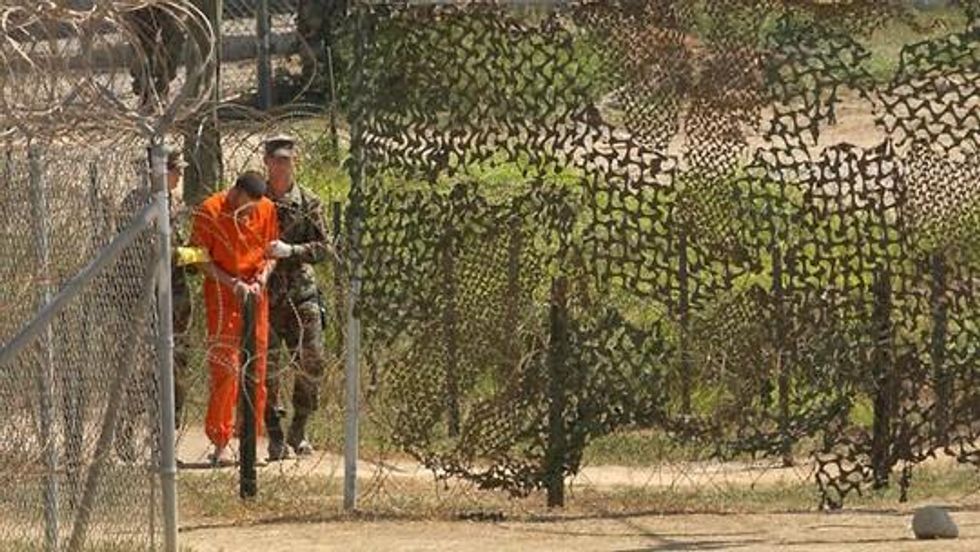GUANTANAMO BAY NAVY BASE, Cuba -- Before this onetime coaling station for the U.S. Navy ships in the Caribbean was transformed into a site holding captives in the war on terror that U.S. officials had called the worst of the worst, most Americans were unaware of its existence.
With a few exceptions, such as the 1992 movie A Few Good Men, a film about military duty and honor, and what happens when soldiers step over the line, the rule seemed to be, out of sight, out of mind.
That changed after Jan. 11, 2002, when the first batch of alleged terrorists arrived. They were put into kennel-like cells measuring 8x8x8 and placed under armed, 24-hour guards who had little or no training in detention. It was all improvised. Donald Rumsfeld and other Bush administration officials gave orders to make it happen. The military saluted and complied.
Twelve years later, Camp X-Ray is little more than an isolated, abandoned tangle of rusting, chain-link cages and barbed wire overrun by weeds and infested with banana rats and other tropical varmints. Elsewhere on the base, lawyers come and go. Litigation continues. Sporadically, hearings of one sort or another are held for some of the remaining 154 detainees still held in four newer camps.
But the spotlight has moved on. Members of the news media, under military escort wherever they go, visit occasionally, but the public's interest level has dropped. Guantanamo is old news and sometimes it seems that no one cares.
Yet they should, if they care about America's standing in the world. Or about public money spent to create an alternative judicial and detention system that seems totally unnecessary in view of the one that already exists on the mainland. Or about the continuing existence of secret prisons maintained by the U.S. government and staffed by government personnel.
The money is spent in many ways. A guard force of more than 2,000 is rotated in and out every nine months, and the detention center commander, Rear Adm. Richard Butler, says planning is underway for troop rotations that will extend well beyond the White House tenure of President Obama.
Doctors at the hospital worry about the aging detainees and their growing medical needs. "Where are we going to be 10 years from now?" one doctor asked, wondering about the future health needs of his patients.
Hundreds of millions of dollars have been spent to upgrade the camp's infrastructure -- jails, administrative buildings and so forth -- and military leaders believe more and better facilities are needed.
As long as the camp is open, it will be seen around the world as a wanton flouting of the rules of law and morality. Slowly, some detainees are being transferred to other countries. Uruguay last week became the latest, and the first in South America, to say it will accept detainees cleared for removal. But most are stuck here, without trial or even the hope of one anytime soon.
The continuing hunger strike by some 15 or so prisoners only adds to the aura of desperation. Guards and their officers complain about being "splashed" by some detainees -- i.e., being hit by cocktails of urine or other bodily fluids, or feces. A minority of prisoners, maybe 40 or so, are still considered "non-compliant," which adds to the stress level of the soldiers serving here.
Despite the best will of some present and past commanders and ranking officers, Guantanamo is still considered by its many critics as a lawless zone, as a place where America disregards its stated allegiance to the rules of fair play.
Transparency, another virtue of democratic government, is similarly disregarded, although the military often strives to meet that goal. But while detention center officials allow reporters to get glimpses of captives receiving meals or books from the prison library, no one will talk about Camp 7, the clandestine lockup for former CIA prisoners. Even the operating costs, building costs and name of the camp's contractors are a secret.
The Miami Herald is suing in federal court to get that information.
These issues -- Guantanamo itself -- cannot be "fixed" by transferring a few more captives, holding more hearings, or bringing in more guards. The only way to fix Guantanamo is to close it.


